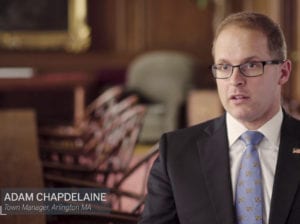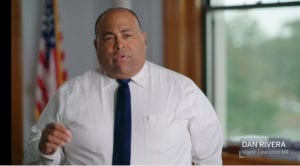Who is a member?
Our members are the local governments of Massachusetts and their elected and appointed leadership.

Arlington Town Manager Adam Chapdelaine discusses the many ways local government affects people’s daily lives in “Property Tax 101: Why the Property Tax,” a video produced by the Lincoln Institute of Land Policy.
The leaders of Lawrence and Arlington share their views on the property tax and local services in a new video from the Lincoln Institute of Land Policy that highlights the connection between taxes and the ability of communities to control their own destinies.
Lawrence Mayor Daniel Rivera and Arlington Town Manager Adam Chapdelaine are interviewed in the nine-minute video, “Property Tax 101: Why the Property Tax,” which explains the importance of the property tax and the value of local government.
“I think about local government as the most important form of government,” Rivera says in the video. “It’s the closest to people. Let me tell you something: if one mayor falls down on the job, if one city council falls down on the job, you feel it immediately. And so local government and the way we fund local government is very, very important.”
The Lincoln Institute’s video makes the case that local government functions well by avoiding much of the partisanship and bureaucracy that bog down higher levels of government. In the video, Chapdelaine says that local governments are able to be nimble and find innovative ways to address issues like transportation needs and climate change. He also said that the work of municipalities is integral to people’s daily lives.
“If we’re doing our job well, you don’t think of us, because it is just your life,” Chapdelaine says.
He also describes the tangible benefits provided by local governments. Every time people turn on a faucet, flush a toilet, put out their trash, or drive on roads that are repaired and plowed, they are experiencing local government doing its job.
“Everything you interact with in your local daily life is somehow supported by local government,” Chapdelaine adds.

Lawrence Mayor Daniel Rivera discusses the importance of direct funding to cities in towns in “Property Tax 101: Why the Property Tax,” a video produced by the Lincoln Institute of Land Policy.
The locally controlled process of taxation and spending gives residents an incentive to become engaged citizens, results in more efficient government, and better matches spending priorities with the wishes and needs of residents, the video points out.
The video includes footage of Arlington’s April 2019 special Town Meeting, where voters deliberated whether the town should build a new high school. After discussing the project and the property-tax implications, the Town Meeting overwhelmingly voted to send the question to the local ballot, where the project was approved a couple of months later.
The video also addresses the differences between Arlington and Lawrence, and the implications for local property taxes. Between 2014 and 2018, Arlington had a median home value of $609,800, compared to Lawrence’s $255,800. As a result, Arlington can raise property taxes more easily for big-ticket items such as a new high school, while Lawrence needs more state funding to provide greater educational equity.
Despite that additional reliance on state funding, Rivera said, his city places great importance on local receipts. It recently increased taxes during the pandemic, he said, because ultimately the city must ensure that it has the police and firefighting protection it needs, and that the streets get cleaned and the sidewalks are fixed.
“No one cares about those things more than us,” Rivera said.
The Lincoln Institute, which has an office in Cambridge, advocates for effective land use, taxation and stewardship, and researches property-tax practices worldwide.
The institute is promoting the video on its social media channels, will feature the video in its digital Land Lines magazine, and ultimately plans to include it on a dedicated property-tax web page as part of a wider education effort. While the institute typically directs its property-tax data toward policymakers, policy analysts and researchers, it hopes that the Property Tax 101 initiative reaches a more general audience nationwide.